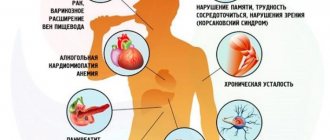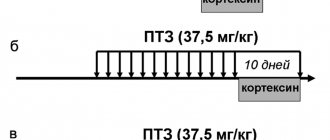Drinking alcohol in large quantities not only leads to the development of persistent addiction, but also provokes the destruction of brain cells. The longer a person drinks, the more his nervous system suffers, and his mental abilities are significantly reduced. If treatment is not started, alcoholism leads to complete personality degradation.
- Read in the article:
- How alcohol affects brain function: mechanism of action
- How many brain cells does 100 grams of vodka kill?
- How does the brain die from alcohol?
- The effect of alcohol on the nervous system
- Stages of brain damage by alcohol
- Cerebellum and alcohol
- How does alcohol affect the brain?
- The brain of a drinker: photo
- The effect of alcohol on the blood vessels of the brain
- How long does it take for the brain to recover after alcohol?
- Causes of cerebral edema from alcohol
- Why do alcoholics have strokes?
- Effect of alcohol on memory
- How does wine affect blood and blood vessels?
- Detoxification of the body from alcohol in
Treatment prices:
| Sign up for a free and anonymous consultation with a narcologist | 0 ₽ |
| Initial consultation with a narcologist | for free |
| Consultation with a psychologist in person or Skype | 3 000 ₽ |
| Psychiatrist consultation | 5 000 ₽ |
| Psychodiagnostics / pathological diagnostics | 7 500 ₽ |
| Narcopsychotherapy | 50 000 ₽ |
| Consultation with a psychologist and selection of a treatment and rehabilitation program for an addict | for free |
| Intervention session | 12 000 ₽ |
| Social rehabilitation of alcohol addicts | for free |
| Outpatient rehabilitation in Moscow | 33 000 ₽ |
| Standard rehabilitation program | 40 000 ₽ |
| Intensive rehabilitation program | 80 000 ₽ |
| Premium rehabilitation program | 120 000 ₽ |
| Medical and social rehabilitation (21 days) | 150 000 ₽ |
| Rehabilitation Spain, Bulgaria | 200 000 ₽ |
| VIP rehabilitation program | 350 000 ₽ |
| Online addiction rehabilitation course | 28 000 ₽ |
| Rehabilitation of age-related alcohol addicts | 50 000 ₽ |
| Rehabilitation of drug addicts | 60 000 ₽ |
| Adolescent social-psychological-pedagogical rehabilitation | 70 000 ₽ |
| Psychotherapy | 5 000 ₽ |
| Family psychotherapy | 6 000 ₽ |
| Support groups for loved ones of addicts | for free |
| Webinars for relatives of addicts | for free |
| School for codependents | 3 000 ₽ |
| Transfer support | negotiable |
| Motivation for treatment | 6 000 ₽ |
| Escort to the clinic | 6 000 ₽ |
| Testing (urine/blood/hair) | specify |
Expand
Still have questions? Call us!
8
Free consultation and appointment
How alcohol affects brain function: mechanism of action
In severe alcohol addiction, ethanol, which is part of alcohol-containing drinks, has a destructive effect on the functioning of the brain and all organs. Drinking even a small amount of alcohol leads to muscle relaxation and causes a feeling of euphoria. The distribution mechanism of ethanol is such that its highest concentration occurs in the brain tissues, and not in the circulatory system. Therefore, it is the brain that suffers the most.
When drinking alcohol, the functioning of neurons is suppressed. This is manifested by the following symptoms:
- Concentration decreases.
- Memory is impaired.
- Brain abilities decrease.
When a person begins to drink systematically, neurons stop performing their direct functions, and this leads to irreversible consequences.
What areas of the brain are affected by alcohol?
The cerebral cortex makes possible the processes of thinking, assimilation of information, and human self-awareness. Large amounts of alcohol damage the cortex and lead to confusion of speech and clouding of consciousness.
Loss of coordination indicates alcohol damage to another area - the cerebellum.
Intoxication of the hypothalamus causes a feeling of excitement, inhibited thinking, and sexual desire.
When alcohol acts on the medulla oblongata, the processes of breathing and blood circulation are disrupted. The person feels drowsy and lacks oxygen.
How many brain cells does 100 grams of vodka kill?
When consumed, alcohol immediately enters the bloodstream and reaches the brain within 5 minutes. The first effect of euphoria occurs due to the release of endorphins, so the person begins to feel happy and sociable. Alcohol does not kill brain cells, but it does have short- and long-term effects on them. If you drink 100 grams of vodka, 8,000 nerve cells will be damaged.
Brain under stress
The brain is an incredibly complex and carefully balanced machine. But as soon as you pour alcohol into it, the balance is upset.
The first thing alcohol does is turn on the calming GABA system, making you feel relaxed. Valium works the same way. This is why we drink. Especially at parties. Most people have some level of social anxiety, and alcohol dispels fears and liberates them.
However, if you push the GABA system too much, it can turn off some brain functions that you don't want to turn off, like reasoning or even consciousness. And if you've had a lot to drink and the GABA system is working at maximum capacity, it turns off the brain in the same way as anesthetics do, and you risk stopping breathing. This is one of the possible reasons why you may die from drinking alcohol. This is what we call alcohol poisoning.
Returning to the ability to reason rationally, have you ever had the intention of having only a couple of drinks, but then lost control and got completely drunk? Why is this happening? One of the main reasons is that alcohol primarily shuts down the prefrontal cortex, the part of the brain responsible for self-control.
Indeed, the areas of the brain responsible for self-control and decision-making are extremely sensitive to alcohol. When you get drunk, you lose the ability to sensibly evaluate not only the number of glasses, but also many other things, including your attractiveness, dancing talent, or flirting ability.
Drink more, and when your blood alcohol level rises above the UK driving limit of 80mg of alcohol per 100ml of blood, or 0.8 ppm, you'll get a double whammy: in addition to stimulating GABA, alcohol will begin to block your glutamate receptors. And we remember that glutamate is a neurotransmitter that keeps a person awake. As you continue to drink, you become truly drunk. Having drunk to a level of 1.5 ‰, you gradually lose the ability to remember. This is where memory lapses come from.
As the concentration of alcohol in the blood increases, it begins to act on more and more neuromodulators, and each of them affects different areas of the brain in its own way.
Three trends are particularly important. First, increasing blood alcohol levels enhances the effect of serotonin, a substance that improves mood and adds empathy to us. This serotonin-stimulating effect of alcohol enhances the attractiveness of others in our eyes, putting so-called “beer glasses” on our noses. In this respect, alcohol is similar to ecstasy (MDMA).
Stimulation of another type of serotonin receptor, located in the nerves of the stomach, causes nausea. We often joke about alcoholic vomiting, but its importance cannot be overestimated - it literally saves our lives. This defense mechanism is one of the reasons why alcohol has been present in our culture for thousands of years. Vomiting helps remove enough alcohol from the body to keep a person alive.
Second, alcohol releases dopamine, which affects determination, motivation, and energy levels. Under the influence of dopamine, you feel cheerful and cheerful, active, energetic and inspired. Dopamine makes you speak louder, which is the same effect cocaine has.
Dopamine is one of the neurotransmitters that reinforce behavior patterns, so it influences the formation of addiction. The release of dopamine may be the reason that a person cannot give up a habit that began as a pleasant, or at least harmless, pastime, but over time ceased to be so (for example, tying hair around a finger or biting nails). In addition, dopamine makes us get involved in stupid drunken arguments and does not allow us to stop in time.
Third, the emotional high you feel when drinking alcohol is caused by endorphins. These are natural analogues of opioids that the body produces itself - a natural pain-relieving system, the source of the so-called “runner's euphoria”. This reward system provides you with a gentler, more relaxed pleasure and for some can be a key factor in addiction. A number of studies have shown that by blocking the effect of endorphins with a drug called nalmefene, some alcoholics are able to stop drinking. Using modern methods of visualizing brain activity, we were able to find out that this effect is related to the interaction of endorphins and dopamine in brain structures.
This abundance of mechanisms of action is what makes alcohol so widely popular. But since we are all different, it will interfere with your personal brain chemistry differently than it will interfere with the chemical reactions in your drinking buddy's head. Perhaps you drink to reduce anxiety? Or after work to relieve stress?
Or to find the strength to go to a party? Or to get drunk and fight? For many, the lion's share of alcohol's appeal is that it fills gaps in your personality, transforming you into the person you would like to be.
The effect of alcohol on the nervous system
Alcoholic drinks affect the functioning of the central nervous system in two ways:
- Penetrates nerve cells and affects receptors and ion channels.
- Activates the functioning of certain brain receptors.
When drinking alcohol, the nervous system is in an excited state. Ethanol stimulates the release of dopamine, which increases activity and gives a person a feeling of euphoria. After resources are depleted, the opposite effect occurs - weakness, depression, and poor health appear.
Features of the effect of alcohol on the brain of pregnant women, children and adolescents
Drinking alcohol has a particularly negative effect on a woman’s body during pregnancy, and is most detrimental to the developing fetus. The child's future life is very likely to be complicated by congenital serious brain diseases. These children are different:
- Slow development.
- Increased skull size.
- Reduced size of the meninges.
- Disturbance of many functions of neuron cells.
Even small amounts of alcohol-containing drinks have a harmful effect on vital organs, especially in adolescents and children. The adolescent brain is not yet fully saturated with the most important chemical element for protecting its cells - phosphorus.
The brain organ of a child and adolescent is in the process of constant structural growth; it is more saturated with water than that of an adult. Therefore, even irregular single small doses of alcohol have a devastating effect on the brain matter, the structure of the organ itself and have terrible destructive consequences for children and adolescents.
To stop the effect of alcohol on the brain to some extent, you can only completely stop drinking alcohol.
Stages of brain damage by alcohol
Alcohol destroys neural connections, due to which there are more and more receiving receptors, and it is more difficult to activate them each time. Brain damage develops in stages and has three stages:
- First . There is a constant desire to drink, the craving for alcohol becomes systematic.
- Average . After drinking alcohol, a severe hangover begins and a strong psychological need for alcohol-containing drinks develops. Diseases of the internal organs begin to develop.
- Heavy . The person degrades, alcoholism becomes chronic.
Recovery methods
For a person who has decided to give up addiction and return to normal life, the question of how to restore the brain after alcoholism is more than relevant. The basic rule is a complete abstinence from any alcohol-containing drinks.
Complete abstinence from alcohol
To restore the brain after prolonged alcohol use, drug therapy (nootropic and vascular drugs, vitamin complexes) is used. These drugs improve brain activity. The brain recovers very slowly, and it is impossible to say exactly how long it will take; the process can take several years. One hundred percent recovery cannot be guaranteed either. The result largely depends on your drinking experience.
Treatment for alcoholic dementia is quite effective in the early stages. If you consult a doctor in a timely manner, it can be completely cured. As the disease progresses, irreversible consequences develop. In this situation, a complete cure is no longer possible; you can only slow down the process.
How does alcohol affect the brain?
The human brain is a complex neural structure, all areas of which are closely interconnected. All of them are responsible for the coordination of movements, for the transmission of information, and for the functioning of internal organs. The normal functioning of brain cells allows people to express their thoughts and feelings, communicate, and remember information.
Regardless of what a person drinks - beer, vodka or cognac, ethyl alcohol enters the body. The harmful substance instantly affects all areas of the brain, leading to the following changes:
- The level of thinking decreases.
- Lost control over movements.
- Drowsiness appears.
- Consciousness becomes cloudy.
- Speech is confused.
Regular drinking causes the addict to become lethargic, develop insomnia, and experience frequent outbursts of aggression. There are frequent cases of the development of mental disorders.
Alcohol and brain vessels
Alcohol has a negative effect on the blood vessels of the brain. They become fragile and sensitive to stress, which easily destroys them. This causes microscopic hemorrhages and reduces the level of blood supply.
In a state of intoxication and a hangover, you can get a brain stroke from alcohol, which in advanced cases causes death.
Regular consumption of alcoholic beverages leads to the fact that a person becomes lethargic, cannot concentrate, suffers from insomnia, is prone to aggression, and develops mental disorders. By acting on blood vessels, alcohol reduces immunity, a person gets sick more often, and loses interest in life and self-development. Alcoholics regularly suffer from headaches and worsen chronic diseases that require long-term treatment.
The effect of alcohol on the blood vessels of the brain
When alcohol enters the body, it constricts blood vessels in the brain. As a result, red blood cells moving through the circulatory system stick together and turn into blood clots. Such clots prevent oxygen from reaching the brain, causing nerve cells to die. With each new alcoholic drink consumed, a person's risk of stroke increases.
The effect of ethanol on different areas of the brain
To understand how harmful ethanol is, you need to describe how it affects different parts of the brain:
- Mesolimbic pathway. Responsible for the emergence of feelings of pleasure and various desires. Associated with the processes of memorization and learning. Under the influence of alcohol, only the desire to have fun comes to the fore. Intellectual abilities are suppressed.
- Hippocampus Takes part in the formation of memories. Helps to navigate in space. Participates in the generation of brain cells. When drinking alcohol, the stable functioning of the hippocampus is blocked. Memory decreases, mental activity seems unbearable to the alcoholic.
- Cerebral cortex. The processes of thinking and analysis depend on it. Alcohol slows down the work of the department. As a result, the alcoholic develops a feeling of liberation. Processing of incoming information is slowed down. Mental reactions are blocked.
- Prefrontal and frontal left cortex. High doses of ethanol reduce the number of neurons in these regions. For this reason, alcoholics lack willpower. They lose problem solving skills. They stop setting goals and making plans. Motivation decreases.
- Pituitary gland and hypothalamus. Responsible for hormonal regulation. This is why dangerous hormonal disorders develop under the influence of alcohol.
- Cerebellum. Regulates muscle tone, motor activity, maintains normal pressure in blood vessels. When it is damaged by toxic metabolites of alcohol-containing drinks, serious problems arise, including complete loss of coordination of movements.
- Amygdala. Emotion assistant. Allows you to sense impending danger. Controls the level of aggression. If damaged by alcohol, it begins to work not at full capacity. For this reason, drinkers consider themselves omnipotent and become fearless.
Alcoholic drinks harm all areas of the brain, it’s just that those listed above suffer more than others. You should not check how long intellectual activity can be maintained during constant binge drinking. Timely treatment of alcoholism is the best prevention of dangerous disruptions in brain function.
How long does it take for the brain to recover after alcohol?
Scientists have proven that after an addict stops consuming products containing ethyl alcohol, the brain suffers for a long time. After giving up drinking, a person continues the recovery process for about six weeks. Even when alcohol is not supplied, the body cannot quickly restore cognitive abilities such as attention and memory. The duration of recovery is influenced by the following factors:
- Alcohol is a powerful diuretic, as a result of which the body loses a lot of fluid during the period of drunkenness. Dehydration occurs and the meninges shrink.
- Along with urine, nutrients such as magnesium, sodium and potassium, which are necessary for normal brain function, are washed out of the body. It takes time to make up for their deficiency.
To avoid all the negative consequences of drinking alcohol, you should stop drinking them forever. If you cannot get rid of addiction on your own, then you need to go to a drug treatment clinic.
What happens to the brain when you drink alcohol too much?
The liver, nervous system and brain receive the main blow from alcohol abuse. Ethyl has a detrimental effect on the brain.
The human meninges need constant and active blood circulation, which sufficiently supplies them with oxygen. Blood inside the brain passes through all its vessels, including the smallest vessels and the finest capillaries, especially many of which are located in the peripheral areas of the brain.
Alcohol entering the human body from the first minutes of consumption has a destructive effect on blood vessels and capillaries. Alcohol narrows them even more and, as it were, “glues” the red blood cells, the so-called erythrocytes. As a result, blood clots form, which seem like huge plugs to the peripheral capillaries. They do not allow oxygen to reach brain cells, which die irrevocably without oxygen access.
Bleeding and death of brain cells is most often the cause of ischemic stroke, a very dangerous disease. Interestingly, the process of death of brain cells has a euphoric effect on the drinker. To some extent, it pleasantly excites him, but deprives him of the ability to think logically and really perceive reality.
Causes of cerebral edema from alcohol
The main cause of cerebral edema is severe intoxication of the body due to alcohol poisoning. The following factors can also trigger swelling:
- Manifestation of allergic reactions . Often, due to drunkenness, a severe allergy develops, which causes swelling.
- Bruises, traumatic brain injuries . People who abuse alcohol may fall or get hit by a car due to poor coordination of movements, so they have an increased risk of injury.
- Poor blood circulation in the brain or, in other words, a stroke . Weak blood vessels in the brain of an alcoholic cannot withstand the load, which leads to stroke and edema.
- Development of cardiac, hepatic or renal pathology . These important organs are primarily affected by alcoholism.
Effect of alcohol on memory
Alcoholic drinks negatively affect memory. A person may experience short-term memory lapses, as well as complete memory loss while drinking. The next day, the addict may forget absolutely everything he did, although his drinking buddies say that he was awake. Under the influence of ethanol, the memory function of the brain changes. Ethanol is a powerful toxin, and if the brain is severely intoxicated, it can change the type of synoptic transmission. Therefore, the brain simply stops working normally.
How does wine affect blood and blood vessels?
Wine, consumed in small doses, can benefit the body. First of all, the drink is beneficial for blood vessels. Wine contains substances that increase the strength and elasticity of the walls of blood vessels.
- Red wine . Dry wines are the most beneficial. They contain magnesium, potassium, antioxidants and fructose. Dilates blood vessels provided you drink no more than 100 ml per day.
- White wine . Contains fewer antioxidants than red wine, but is also rich in nutrients. Reasonable consumption helps strengthen the immune system.
Still have questions? Call us!
8
Free consultation and appointment
Detoxification of the body from alcohol in
With prolonged consumption of alcohol, toxic substances formed during the breakdown of ethanol accumulate in the body. To get rid of poisons and toxins, you should detoxify your body. Specialists of the drug treatment center carry out the cleansing procedure in the hospital and at home.
Professionals use IVs, intravenous and intramuscular injections for this purpose. All medicines are certified and highly effective. Only an individual approach from specialists, drug therapy and rehabilitation will help you get rid of alcohol addiction forever.
Morning hangover
It usually begins about 10 hours after blood alcohol levels peak, but this varies depending on gender, weight and genetic predisposition. And as you probably know from your own experience, it can last from a few hours to a day. And because alcohol affects many systems in the brain and the rest of the body, the manifestations of a hangover are also very diverse and include many different disorders. Symptoms range from restless sleep, dehydration, anxiety, tension and low mood to decreased attention, memory loss and partial loss of psychomotor skills. What causes them?
Sensitivity to light and sound is a result of compensation for blocked glutamate receptors.
Headaches can occur for the same reason, plus acetaldehyde, which dilates the blood vessels of the brain. In addition, new research suggests that alcohol causes the immune system to attack its own body. Alcohol appears to be able to activate immune cells that normally protect us from germs and toxins, releasing chemicals that irritate blood vessels and nerves, and this can cause pain, including headaches.
Dehydration also plays a role: alcohol has a diuretic effect, that is, it increases the volume of urine excreted. You can try drinking as much water as possible before going to bed, but of course you will have to constantly get up to urinate and you will not sleep well.
Gastrointestinal symptoms: Alcohol damages the lining of the stomach and intestines, leading to diarrhea and nausea. In addition, your pancreas may become slightly inflamed - pancreatitis is often a consequence of binge drinking.
Science does not yet fully understand the processes that occur in the body during a hangover. But we do know that hangovers are caused by many different biochemical and neurochemical changes that are influenced by your genotype.
- You have poisoned yourself. Alcohol is processed in the body by an enzyme called alcohol dehydrogenase (ADH). This enzyme breaks down ethanol, turning it into acetaldehyde, a poison and carcinogen. That, in turn, quickly turns into vinegar and eventually decomposes into water and carbon dioxide. However, in some people the corresponding enzymes may be slightly different due to genetic characteristics, and therefore the breakdown of alcohol may occur faster or slower. By studying people who slowly break down acetaldehyde, we established exactly what unpleasant symptoms it is responsible for: flushing, nausea, accelerated heartbeat. So some of the hangover sensations are due to the acetaldehyde accumulated in the body. Methanol, a product of the fermentation of sugars, is also believed to be responsible for most hangover symptoms. ADH breaks down methanol more slowly than ethanol, turning it into formaldehyde (used for embalming corpses) and formic acid (which is injected into us when bees and ants sting) - both substances are extremely toxic.
- Your neurotransmitters have gone haywire. I have already mentioned changes in the two main neurotransmitter systems - glutamate and GABA. As has been shown in rodents, the degree of imbalance between the two, particularly excess glutamate and deficiency of GABA, correlates with the severity of withdrawal symptoms.
- An inflammatory process develops in your body. Inflammation begins when the body is harmed as part of the immune response. Although this is a natural reaction of the body, it can be extremely destructive. It is now believed that chronic inflammation can have a range of long-term consequences, from diabetes to cancer and, as we will see in the next chapter, cirrhosis of the liver. Alcohol starts this process, damaging the blood vessels and intestines, but then the body maintains it on its own. The inflammatory response is unpleasant - symptoms can include nausea, vomiting, headache, confusion and tremors, clinical depression, mood swings and cognitive impairment, as well as problems with memory and learning. This is why anti-inflammatory medications such as ibuprofen can relieve hangover symptoms.
- Mitochondrial dysfunction. Alcohol damages mitochondrial DNA, especially in the liver. Mitochondria are busy producing energy in cells, and free radicals that are formed during the conversion of alcohol to acetaldehyde disrupt their work. Brain cells depend on the energy supplied by mitochondria, and even minor damage to them can adversely affect the functioning of several parts of the brain.








